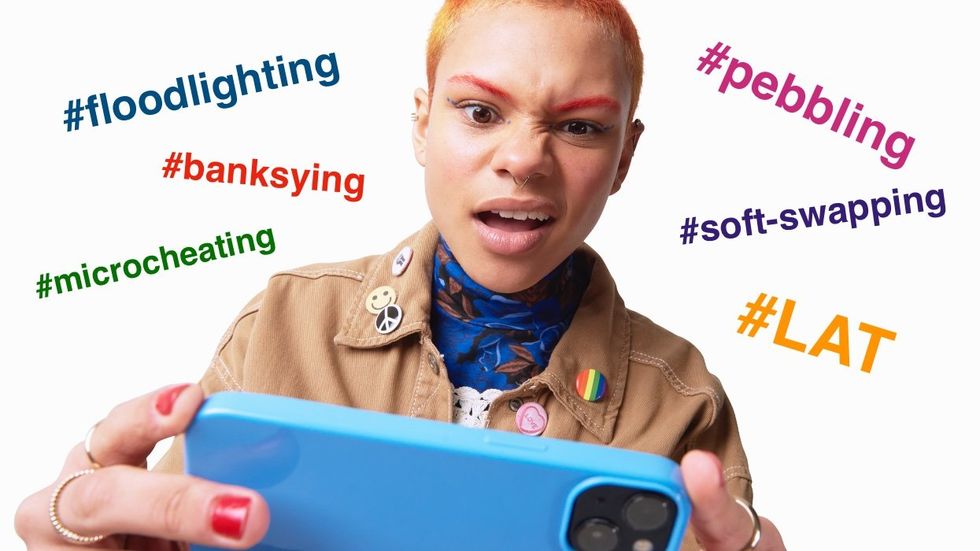

Have dating and relationships always been this complicated? Social media and dating apps have definitely added new layers of complexity to modern dating, but there also seems to be an explosion of language to describe all the trends and behaviors singles and non-monogamous folks are experiencing while out in the wilds of finding partners.
Feeling overwhelmed by all the discourse and not sure what all these new buzzwords taking over your timeline actually mean? No worries—we’ve got you covered. Here are the dating and relationship trends people are talking about in 2025… so far.
Pebbling
You’ve probably heard it’s the little things that matter, and “pebbling” is a new way of essentially saying that. It gained traction online and is inspired by the Gentoo penguin’s sweet love language, where male penguins gift female penguins with small pebbles to build their nests in a unique courting ritual.
Humans looking for love aren’t gifting each other rocks (unless maybe you’re an LA lesbian giving a prospective partner some healing crystals), but they are sending small tokens of their affection throughout the day, like funny memes, a TikTok video that made you smile, or buying them their favorite snacks.
It can be an incredibly sweet and low-key way to show someone you care — unless, of course, you take it too far. It’s also particularly popular with LGBTQ+ folks for a good reason.
Learn more about pebbling.
Banksying
Pebbling may be sweet... but banksying? Not so much. This toxic trend is a clever name for a cruel way to end a relationship by slowly destroying it from the inside out.
It gets its name from the infamous street artist Banksy, known for his mysterious art that pops up out of nowhere. But instead of a satirical piece of street art that self-destructs — like one of Banksy’s paintings did — it’s a selfish way to end a relationship to protect yourself by withdrawing emotionally and destroying the relationship from within, so that when the relationship ends, you’re prepared and your partner is blindsided. It’s essentially “quiet quitting” your relationship. And yes, the gays are definitely doing it.
For more about Banksying.
Pocketing
Ever felt like the person you’re dating is keeping you separate from their friends and family? Well, they may be pocketing you. It’s a new dating term to describe when one partner avoids introducing the other to their friends, family, or co-workers. While anyone can pocket, queer folks may be particularly prone to doing it for various reasons — some understandable, some less so.
For more about pocketing.
Floodlighting
We’ve all been on a date with someone who is a serial oversharer, but floodlighting takes that to the next level and is an unfortunately common toxic dating trend.
In a nutshell, when someone floodlights you, they are disclosing deeply personal or emotionally intense information early in a relationship to artificially pull you in close faster — it’s related to another toxic behavior, love bombing. But instead of overwhelming you with romantic feelings, it’s a form of manipulation through intense trauma bonding.
For more about floodlighting.
Heterofatalism
Heterofatalism may have first been coined to describe how straight women feel about dating men, but sadly queer folks can relate, too. It was coined by sexuality scholar Asa Seresin, who originally called it “heteropessimism” to describe straight women’s frustration with the way men behave when dating. “It’s that weary ‘ugh, men’ energy, but laced with deeper grief,” licensed marriage and family therapist Melissa Klass tells PRIDE. Heterosexual women aren’t the only ones who date straight men, so there's a chance you are feeling it, too.
For more about heterofatalism.
Soft Swapping
Ethical non-monogamy isn’t foreign to many queer folks, but anyone who has engaged in it knows there is plenty of nuance. Soft swapping is one of those nuances.
In an open relationship, both partners can date and have sex with people outside of the committed relationship, but with soft swapping, partners become intimate with people within a friend group or swinging community, and sexual contact is limited. This is different from “hard swapping” or “full swapping,” which refers to swinging where penetrative sexual activity is allowed.
For more on soft swapping.
LAT Relationships
Love your partner to pieces, but wish sometimes they would just go home? Then a LAT relationship may be just what you’re looking for.
“The term ‘LAT relationships’ originated with a Dutch writer in the 1970s, but it’s gotten popularized recently because it has a lot of appeal,” Dr. Ruth L. Schwartz, PhD, a queer relationship coach and Director of Conscious Girlfriend Academy, tells PRIDE. “LAT stands for ‘Living Apart Together,’ and refers to couples who are in a committed relationship but choose to live separately. In other words, you can be fully partnered — rings, group chats, pet insurance, the whole nine — but keep two sets of keys.”
For more on LAT relationships.
Micro-Cheating
Have you ever asked for someone’s number and saved it in your phone under a different name? Or do you find yourself flirting with “friends” and then feeling the need to delete it? Even if you’ve never followed through and gotten physical with the other person, what you’re doing are some of the many ways one can micro-cheat.
What is that? It’s when “a partner engages in intimate, non-physical — and often online — behaviors with people outside of their relationship that lead to a slow erosion of trust and psychological safety within their relationship,” marriage and family therapist Layne Baker tells PRIDE, adding that the term is credited to Australian psychologist Melanie Schilling.
While this dating behavior seems largely harmless, experts warn it’s actually detrimental to the relationship because it damages trust.
For more on micro-cheating.
